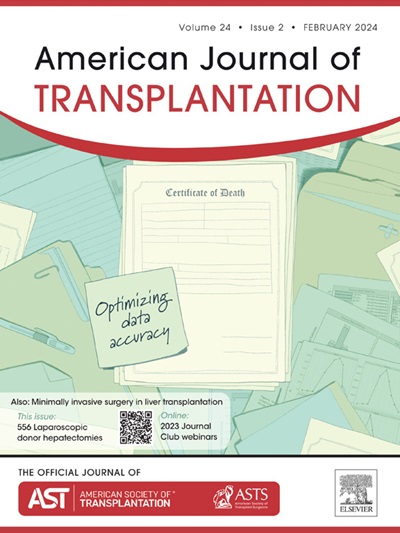Predicting the success of antibody removal with therapeutic plasma exchange: The role of serum dilutions
IF 8.9
2区 医学
Q1 SURGERY
引用次数: 0
Abstract
Therapeutic plasma exchange (TPE) remains a primary therapy for addressing circulating donor-specific antibodies against mismatched human leukocyte antigens, which pose a significant challenge to successful transplantation of solid organs and hematopoietic cells. In this study, we aimed to evaluate the response to 5 TPE sessions in patients undergoing desensitization, as well as in patients who developed antibody-mediated rejection posttransplant. Sera collected before and after each TPE session was treated with EDTA and tested using the single-antigen bead assay as undiluted or 1:4, 1:16, 1:64, and 1:256 diluted. The reduction in human leukocyte antigen antibodies correlated with previously established total immunoglobulin G reduction levels. However, we observed that class I antibody levels were reduced by 85% to 90% while class II antibodies were reduced by only 75% to 80% after 5 TPE sessions. We also found that dilutions performed on pretreatment serum were predictive of the response to TPE. This approach was used to design TPE-based desensitization protocols for highly sensitized patients across various organ and tissue types, as well as for treating patients with antibody-mediated rejection. Our data suggest that serum dilution may be an effective method for assessing the likelihood of response to TPE, thereby aiding in the guidance of treatment strategies.
预测治疗性血浆置换抗体去除的成功:血清稀释度的作用。
治疗性血浆交换(TPE)仍然是解决针对不匹配人类白细胞抗原(HLA)的循环供体特异性抗体(DSA)的主要治疗方法,这对实体器官和造血细胞的成功移植构成了重大挑战。在这项研究中,我们评估了接受脱敏治疗的患者以及移植后出现抗体介导的排斥反应(AMR)的患者对五次TPE治疗的反应。在每次TPE之前和之后收集的血清用EDTA处理,并使用未稀释或1:4,1:16,1:64和1:256稀释的单抗原珠试验进行检测。HLA抗体的降低与先前确定的总IgG降低水平相关。然而,我们观察到,在5次TPE治疗后,I类抗体水平降低了85-90%,而II类抗体仅降低了75-80%。我们还发现,对预处理血清进行稀释可以预测对TPE的反应。该方法被用于设计基于tpe的脱敏方案,用于各种器官和组织类型的高度敏感患者,以及治疗AMR患者。我们的数据表明,血清稀释可能是评估TPE反应可能性的有效方法,从而有助于指导治疗策略。
本文章由计算机程序翻译,如有差异,请以英文原文为准。
求助全文
约1分钟内获得全文
求助全文
来源期刊
CiteScore
18.70
自引率
4.50%
发文量
346
审稿时长
26 days
期刊介绍:
The American Journal of Transplantation is a leading journal in the field of transplantation. It serves as a forum for debate and reassessment, an agent of change, and a major platform for promoting understanding, improving results, and advancing science. Published monthly, it provides an essential resource for researchers and clinicians worldwide.
The journal publishes original articles, case reports, invited reviews, letters to the editor, critical reviews, news features, consensus documents, and guidelines over 12 issues a year. It covers all major subject areas in transplantation, including thoracic (heart, lung), abdominal (kidney, liver, pancreas, islets), tissue and stem cell transplantation, organ and tissue donation and preservation, tissue injury, repair, inflammation, and aging, histocompatibility, drugs and pharmacology, graft survival, and prevention of graft dysfunction and failure. It also explores ethical and social issues in the field.

 求助内容:
求助内容: 应助结果提醒方式:
应助结果提醒方式:


